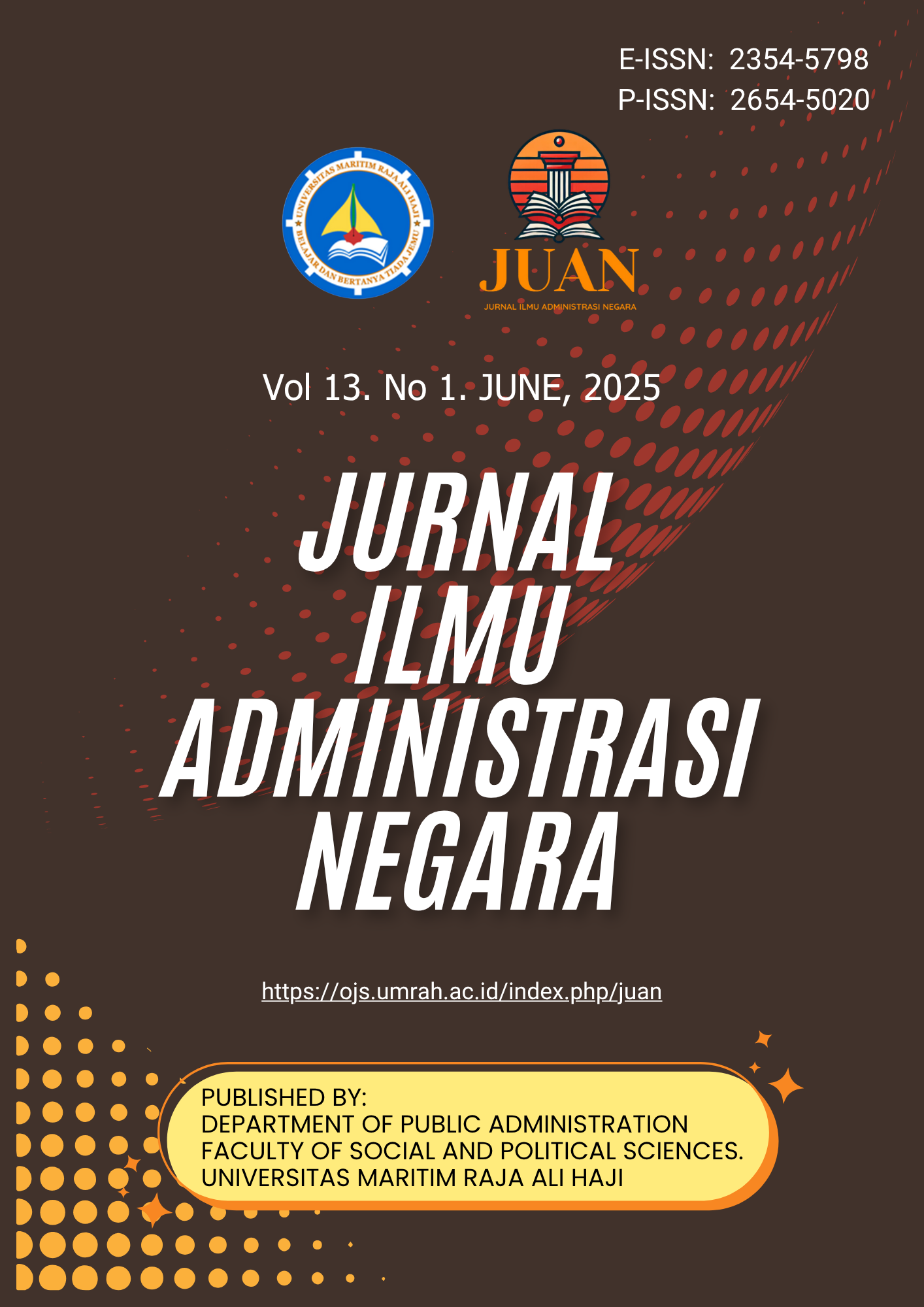Fiscal Decentralization Policy and Its Impact on the Development of Underdeveloped Regions in South Sulawesi
DOI:
https://doi.org/10.31629/juan.v13i1.7527Keywords:
Fiscal Decentralization, Regional Development, Governance CapacityAbstract
Fiscal decentralization has been a key element of Indonesia’s regional autonomy policy, aiming to distribute authority and resources from the central to local governments to foster equitable development. Despite substantial increases in fiscal transfers through mechanisms such as the General Allocation Fund (DAU) and Special Allocation Fund (DAK), underdeveloped regions in South Sulawesi continue to face persistent development gaps in infrastructure, public services, and socioeconomic outcomes. This study aims to examine the implementation of fiscal decentralization policies and their impact on the development of underdeveloped districts in South Sulawesi, focusing on the interplay between fiscal transfers, local governance capacity, and geographic constraints. Using a qualitative library research method, data were collected from government regulations, official reports, statistical data, and scholarly literature, and analyzed through content analysis to identify key themes related to policy objectives, implementation, and development outcomes. The findings reveal that while fund allocation and disbursement rates are generally high, the developmental impact is constrained by weak budget planning, limited technical capacity, poor inter-agency coordination, and the dominance of routine expenditures over capital investments. Geographic challenges, particularly in remote and island districts, further inflate development costs and delay project completion. The study concludes that fiscal decentralization in South Sulawesi requires comprehensive reform, including differentiated allocation formulas, performance-based incentives, enhanced technical assistance, and stronger accountability mechanisms. Such measures are essential to ensure that fiscal decentralization achieves its intended goal of promoting inclusive, equitable, and sustainable regional development.
Downloads
References
Astari, A. J., Aliyan, S. A., Bratanegara, A. S., Muslim, A. B., Nurawaliyah, V. I., & Mohamed, A. A. A. (2024). Understanding The Scope of Regional Geography: A Perspective from Indonesia’s Geographic Region. E3S Web of Conferences, 600, 02018. https://doi.org/10.1051/E3SCONF/202460002018
Augustine, I. P., Djuwita, D., & Fauzi, Moh. M. (2023). The Effect of Special Allocation Fund and General Allocation Fund on Poverty Rate in Cirebon Regency. Cirebon International Journal of Economics and Business, 1(2), 110–124. https://doi.org/10.24235/CIJEB.V1I2.17
Bird, R. M., & Smart, M. (2002). Intergovernmental Fiscal Transfers: International Lessons for Developing Countries. World Development, 30(6), 899–912. https://doi.org/10.1016/S0305-750X(02)00016-5
Coast, J., & Jackson, L. (2017). Understanding primary data qualitative. In Qualitative Methods for Health Economics. Bloomsbury Publishing.
Epple, D., & Nechyba, T. (2004). Fiscal Decentralization. Handbook of Regional and Urban Economics, 4, 2423–2480. https://doi.org/10.1016/S1574-0080(04)80012-9
Haruni, B. (2023). Laporan Kinerja Instansi Pemerintah LKIP Tahun 2023 Provinsi Sulawesi Selatan.
Henkel, M., Seidel, T., & Suedekum, J. (2021). Fiscal Transfers in the Spatial Economy. American Economic Journal: Economic Policy, 13(4), 433–468. https://doi.org/10.1257/POL.20180294
Kis-Katos, K., & Sjahrir, B. S. (2017). The impact of fiscal and political decentralization on local public investment in Indonesia. Journal of Comparative Economics, 45(2), 344–365. https://doi.org/10.1016/J.JCE.2017.03.003
Maket, I., & Naibei, R. (2025). Fiscal decentralization and devolved healthcare service availability outcomes in Kenya: Evidence from panel dynamic approach. Regional Science Policy & Practice, 17(9), 100213. https://doi.org/10.1016/J.RSPP.2025.100213
Manga, J. R. A., & Fouopi, C. D. (2025). The effect of fiscal decentralization on urbanization: Evidence from Cameroon. World Development Perspectives, 39, 100709. https://doi.org/10.1016/J.WDP.2025.100709
Oates, W. E. (1999). An Essay on Fiscal Federalism. Journal of Economic Literature, 37(3), 1120–1149. https://doi.org/10.1257/JEL.37.3.1120
Patton, M. Q. (2002). Qualitative research and evaluation methods. In Qualitative Inquiry (Vol. 3rd). SAGE. https://doi.org/10.2307/330063
Ren, H., Xian, Z., Zhu, B., & Lin, H. (2025). Fiscal decentralization and regional Innovation: Dual mechanisms of human capital mediation and financial development moderation. International Review of Economics & Finance, 102, 104370. https://doi.org/10.1016/J.IREF.2025.104370
Santi, S. D., & Iskandar, D. A. (2021). Kebijakan Desentralisasi dan Ketimpangan Capaian Pembangunan Wilayah Di Indonesia. Jurnal Syntax Admiration, 2(3), 490–506. https://doi.org/10.46799/JSA.V2I3.198
Smoke, P., & Lewis, B. D. (1996). Fiscal decentralization in Indonesia: A new approach to an old idea. World Development, 24(8), 1281–1299. https://doi.org/10.1016/0305-750X(96)00042-3
Song, J., Sun, X., & Gao, C. (2025). Do public services affect economic growth? Evidence from China under the fiscal decentralization perspective. International Review of Economics & Finance, 102, 104378. https://doi.org/10.1016/J.IREF.2025.104378
Suryantini, N. P. S. (2017). The Influence Of DAU (General Allocation Fund) And DAK (Special Allocation Fund) On Capital Expenditure Of Bali Province. Economics and Business Solutions Journal, 1(2), 1–9. https://journals.usm.ac.id/index.php/ebsj/article/view/620
Talitha, T., Firman, T., & Hudalah, D. (2020). Welcoming two decades of decentralization in Indonesia: a regional development perspective. Territory, Politics, Governance, 8(5), 690–708. https://doi.org/10.1080/21622671.2019.1601595
Zheng, F., Bai, Y., Hu, M., & Liou, J. (2025). Fiscal decentralization and rural public services–a new structural economics perspective. Finance Research Letters, 83, 107614. https://doi.org/10.1016/J.FRL.2025.107614
Downloads
Published
Issue
Section
License
Copyright (c) 2025 Andi Amytia Resty Dwiyanti, Irmawati Irmawati, Anita Syam, Asriadi Asriadi

This work is licensed under a Creative Commons Attribution-ShareAlike 4.0 International License.
You are free to:
- Share — copy and redistribute the material in any medium or format for any purpose, even commercially.
- Adapt — remix, transform, and build upon the material for any purpose, even commercially.
- The licensor cannot revoke these freedoms as long as you follow the license terms.
Under the following terms:
- Attribution — You must give appropriate credit, provide a link to the license, and indicate if changes were made . You may do so in any reasonable manner, but not in any way that suggests the licensor endorses you or your use.
- ShareAlike — If you remix, transform, or build upon the material, you must distribute your contributions under the same license as the original.
- No additional restrictions — You may not apply legal terms or technological measures that legally restrict others from doing anything the license permits.














